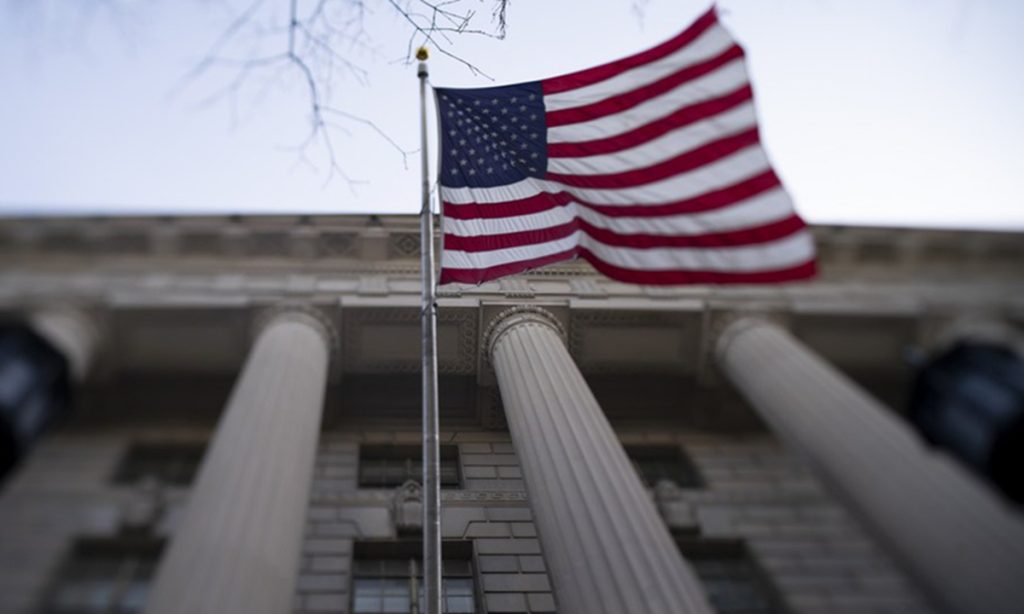Mandating flags be born only in the US is a joke on globalization

The US Congress has found a new method to save US manufacturing: making the lineage of the US flag pure. This has turned the flag into a focal point for trade protectionism. However, this idea of using a "pure-blood" US flag will not necessarily revive US manufacturing, nor can it enhance American patriotism; instead, it only exposes the illusions and weakness of US nationalism and highlights the ugly side of US politicians.
According to US media reports, the All-American Flag Act has been passed by Congress, requiring the federal government to purchase only American flags that have been completely manufactured in the US. Advocates of the measure argue that in 2017, the US imported some 10 million American flags, and 99.5 percent of them came from China. It's time for US flags to originate in the country they represent, said the sponsors of the proposal.
If the flag must originate from the US, should other symbols of the US, such as statuettes of the Statue of Liberty, also be manufactured domestically? The extremism of US trade protectionism has reached the level of nonsense. What's next? Will American lawmakers hype up China's "overcapacity of flags," or will they require that every stitch on the Stars and Stripes be hand-sewn by "pure-blood" Americans?
Supporters of the proposal said the change is more than just symbolic - they believe it will support US jobs and manufacturers. Politicians have a rosy view: They believe they can revive US manufacturing while simultaneously running a patriotic education campaign. However, in 2015 the value of US flag imports was only $4.4 million, according to federal data. Rather than enacting substantial economic policies to truly revive US manufacturing, politicians are wasting energy on a matter worth only a few million dollars. This is clearly not a fundamental solution to US' manufacturing problems but merely a façade project.
"This is a typical case of the US' pursuit of 'decoupling' with China in a form of psychological warfare and political grandstanding," Shen Yi, a professor at Fudan University, told the Global Times. Some US politicians, lacking an understanding of the practical issues involved in producing flags, such as labor and production costs, blindly manipulate politics for political gain based solely on their imaginations.
In the face of numerous crises such as domestic social division and political polarization, the US Congress chooses to prioritize the issue of the flag. The reason is simple: Some politicians lack the ability to address truly important matters but need to appear capable, so they focus on high-profile topics related to "national symbols" to gain political influence. As some netizens sarcastically pointed out, there are many significant events occurring in the world, yet the US chooses to spend time on trivial matters.
The proposal reflects US politicians' concerns about US manufacturing being overshadowed by "Made in China" products. They seem obsessed with bringing manufacturing back to the US. The All-American Flag Act is just the tip of the iceberg of the US' dual strategy: closing doors to Chinese imports while attempting to promote domestic factory development through reindustrialization.
However, what the US is doing is essentially an upgraded version of protectionism and a generalization of national and economic security concepts, aimed at keeping industries and jobs in the US. Ironically, this may backfire. The All-American Flag Act risks causing US consumers to incur additional costs for purchasing flags, as the US may not be able to produce goods as cheaply and efficiently as China.
The US has always positioned itself as an advocate of free trade, but now it seems that the core principle of US-style free trade is "American interest first." After all, not even the flag can be bought from the global market - this is truly a joke on globalization.
Currently, the bill is awaiting President Joe Biden's signature to become law. In the future, when the "pure-blood American flag" rises high, what people may see behind it is not the so-called symbol of identity, resolve and values as one people, but rather US nationalism and political anxiety. When US' dignity and values are so fragile that they need to be ensured by the place of origin of the flag they wave, it in itself reflects the decline of the US empire.